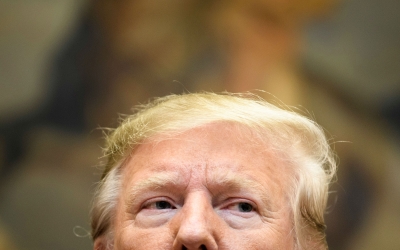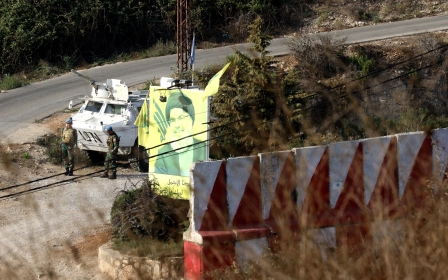Israel looks on nervously as Trump abandons his Syrian allies

The unbelievable happened this Jewish New Year: for the first time, President Trump was compared in Israeli media to his predecessor Barack Obama.
It is not a small thing. For the majority of Israelis (who lie between the centre and the far-right) Trump is an American idol, the best friend Israel ever had in the White House.
Barack Hussein Obama was, for those very same Israelis, the epitome of all evil.
According to Pew, a Washington based research centre, a recent study showed only two out of 37 countries preferred Trump to Obama - Russia and Israel.
They probably still do. But the sense of concern and pending betrayal triggered by the sudden withdrawal of US troops from northern Syria and ruthless abandonment of the Kurds, allies of both America and Israel, now trumps the initial adoration.
Neither the Israeli military nor politicians consider the US troop drawdown and Turkish military offensive that has followed it as an imminent danger to Israel.
So far, the “unrest”, as officials tend to define the situation, is restricted to a region remote from the Israeli-Syrian border.
Nevertheless, two factors are of great concern to Israel.
One is the fact that this dramatic move came as a surprise to even the highest level of decision-makers in Israel. Another is the disappointment that Trump has revealed himself to be, in fact, an unreliable ally.
A day before Trump’s dramatic announcement, the Israeli cabinet held a lengthy emergency meeting to discuss Iran.
Sources in the cabinet admit Trump’s decision was not even mentioned - probably because it was not even known to the highest officials.
'When the Kurds, allies in the fight against Islamic State, are abandoned in the most ruthless way, we should be very troubled'
- Major General Amos Gilad
It came as a total surprise, which former research chief of military intelligence Major General Amos Gilad defined as a “failure in assessment and policy in the highest levels between Israel and the US”.
“When the Kurds, allies in the fight against Islamic State, are abandoned in the most ruthless way, we should be very troubled,” he lamented on radio on Thursday morning.
According to Gilad, Trump’s foreign policies have been negatively affecting Israel rather than the other way around.
“His no reaction policy when Iran attacks Saudi Arabian oil facilities or when Iran shoots down an American drone projects weakness. That is bad for Israel since American deterrence is Israeli deterrence as well,” the military man said.
“On the other hand, Trump is still a stronghold where we need him: in the UN Security Council. So the lesson for Israel now is self-reliance.”
Fear and betrayal
Although "betrayal" is a word is not officially uttered as part of political jargon, it is felt profoundly, alongside a fear of what is yet to come.
“There is no room for surprise,” Major General Amiram Levin, former commander of the Israeli military’s Northern Command, tells MEE.
“For two years now I have been warning that Israeli policy is based on the false assumption that Trump is the great friend. It is about time Israel understands that as long as Trump is in power, Israel has no one to rely on.”
Levin says Israelis must relinquish the idea that Israel and the US are one. He adds that it was “a big mistake” to believe that Israel would lead a combined fight against Iran.
“It is about time to withdraw to more realistic, limited targets, and focus on issues that pose a real danger to Israel. Iran, as it is now, is not one of them,” Levin says.
“The bottom line is just not to go beyond the necessary just because we can, and certainly not to boast and brag about it.”
The reaction on the popular level is no less telling than the official ones, and remarks on social media have insinuated Trump is even worse for Israel than Obama.
Meanwhile an article in Mida, a right-wing website closely associated with Netanyahu, suggested that there wasn’t much difference between the two US presidents after all.
“Trump, as well as Obama, wants to get America out of the Middle East, a region that lost its strategic importance. The difference is that Trump does it in his own unique rhetoric,” Alex Greenberg wrote on the site.
This is all a far cry from the days, just months ago, when Trump provided a gift to Netanyahu when he formally recognised Israeli sovereignty over the occupied Golan Heights.
The act was sealed with a kiss - a real one - which is not a very popular act in western diplomacy.
Netanyahu reciprocated not just with a kiss. He announced the establishment of a new settlement in the Golan named after Trump.
That might be the funny part of the political romance. On a more serious note, Netanyahu was the first Israeli premier to exclusively play the Republican card, contrary to decades of bipartisan policy his country has implemented.
'It is about time Israel understands that as long as Trump is in power, Israel has no one to rely on'
- Major General Amiram Levin
That love affair was supposed to last forever and outlive warnings by the Israeli opposition and experts, who reminded Netanyahu that his relationship with Trump was based on interests that tend to change.
But their advice became prescient in September when Netanyahu failed to win the repeat parliamentary elections.
Trump, the man with “great and unmatched wisdom”, as he described himself in a tweet a few days ago, loves winners. And Netanyahu was suddenly not one of them.
Within hours of the exit polls, the US president turned ice cold towards Netanyahu, despite his ally suffering under political turmoil and looming corruption charges.
All that, right before Trump was about to publish his long-overdue Israel-Palestine peace plan and ink a defence treaty that would have been a boon to Netanyahu.
Now comes the withdrawal, the abandonment of the Kurds and the licence to kill handed over to the Turks.
Confused? It is just the beginning, before international policy is translated into domestic politics by a prime minister still struggling to form a government.
Middle East Eye delivers independent and unrivalled coverage and analysis of the Middle East, North Africa and beyond. To learn more about republishing this content and the associated fees, please fill out this form. More about MEE can be found here.






